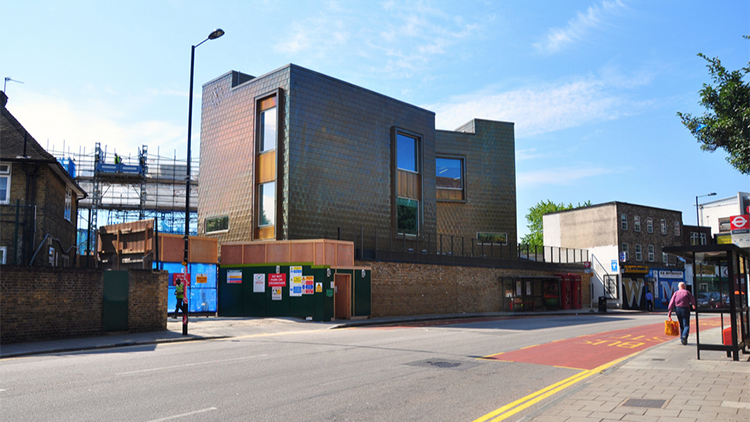
Orchard School, Hackney. Pic: TECU UK
Local schools in Eastlondonlines’ boroughs could lose millions of pounds in funding as a result of budget cuts over the next four years, according to research by teachers’ unions.
Hackney’s schools would be the worst hit of the boroughs, losing an average of nearly 16 per cent of their funding from now until 2020. Unions estimate this would represent a loss of around £1,077 per pupil. The borough has now launched a consultation exercise asking local people what sort of education provision they want in the future.
According to the forecasts analysed by ELL, Tower Hamlets will lose 14.5 per cent of its funding (or £988 per pupil over the next four years). Lewisham schools will lose about 13 per cent of their funding, or an average loss of £732 per pupil. Schools in Croydon will lose an average of 6.4 per cent in funding: around £300 per pupil.
How will your school be affected by budget cuts?
Councillor Anntoinette Bramble, Deputy Mayor of Hackney, said: “There’s no doubt that adequate funding is absolutely critical to the success of a school, and Hackney is a testament to that.”
“Just 15 years ago, we had some of the worst schools in the country, now we have some of the very best, and this short-sighted funding formula threatens this incredible turn around.”
In response to Tower Hamlets’ forecast, Christine McInnes, Head of Education and Partnerships at Tower Hamlets Council, said: “The government are in the process of reviewing school funding and we are anticipating all schools will be affected in some way. However, since the budget reform programme has been delayed by a year it is not possible at this point to identify what the impact will be.”
The National Union of Teachers (NUT) and the Association of Teachers and Lecturers (ATL) estimate that unless the government allocates more funding, 92 per cent of schools in England will lose money, with total cuts to their funding of £2.5 billion per year by 2020.
Kevin Courtney, NUT General Secretary, said: “No head teacher should be put in the position of increasing class sizes, leaving building repairs undone or cutting staff and resources simply to balance the books.”
“Nor should any parent accept this for their child. We are one of the richest countries in the world. We can and we should be funding our schools properly.”
The unions created these forecasts from the latest Department for Education (DfE) data along with the government’s National Funding Formula plan. The website’s interactive map displays funding losses over the next four years, including spending cuts per pupil and the number of teachers lost as a result of budget cuts.
ELL found that Haggerston School in Hackney will sustain the largest monetary loss across the four boroughs with a difference in funding of £1,015,295 by 2020. Dave Davies, branch secretary for NUT Hackney, said that schools in Hackney have already started to feel the consequences of less funding.
He said: “In Hackney we’ve already seen cuts over the past two years. I had a report from a rep recently, and the sort of things we are seeing are teachers being dismissed, such as numbers count and reading recovery teachers.”
“We’re also seeing music lessons, which used to be free or have nominal charge, seeing increase in charges. Teachers themselves are having to fork out for equipment and supplies, because they aren’t being supplied by school.”
According to the unions, factors such as child poverty may also worsen the impact of cuts.
Mary Bousted, ATL General Secretary, said: “The Government must increase funding for schools. If it just reallocates the existing budget many children will lose out, with some of the most deprived hit hardest.”
Bousted said: “The formula for schools’ funding must not be reformed while making real terms cuts to spending. All children deserve a fair chance to succeed and should not suffer because schools are under-resourced and teachers over-worked.”
The estimated budget cuts may hit Tower Hamlets harder than most boroughs in London, as approximately 42 per cent of children are living in low-income families. The borough also ranks seventh out of all London boroughs for the percentage of funding it will lose from the cuts.
The above chart shows each borough plotted according to its percentage of children in poverty and estimated reduction in school funding. ELL boroughs are highlighted in orange.
Croydon appears to be one of the least affected boroughs, with an estimated loss of around £300 per pupil.
A Croydon council spokesperson said: “The impact on Croydon is not yet known because the outcome of the National Funding Formula consultations has yet to be declared, so the figures shown are speculative. However, Croydon is one of the worst-funded boroughs in London, with per-pupil funding some £2,000 lower than in neighbouring authorities.”
In addition to the estimated budget cuts, Croydon schools are receiving reduced education grants. Croydon’s Education Services Grant, which funds school improvements and efforts to reduce non-attendance, was reduced by £200m last year.
The spokesperson said: “The potential for further reductions is a clear cause for concern at a very challenging time, but despite the low level of funding currently coming into Croydon’s schools, they have continued to achieve significant improvements in educational standards.”
Though some schools may gain from the funding reforms, the school cuts website claims that due to the government’s funding freeze, “almost every school will lose when the impact of inflation and other cost increases.”
The Department for Education has condemned the forecasts as “scaremongering based on speculation”.
A spokesperson for DfE said: “As the NUT and ATL’s own report admits, they do not even reflect the Government’s proposed fairer funding formula for schools, which is yet to be published.”
The government’s full plans for the National Funding Formula are expected to take effect in April 2018. Davies said that once these plans are announced, the NUT school cuts formula will be updated.
He said: “The problem is a lot of these cuts are stealth cuts. They’re done in secret. I think we have a duty to let people know the extent to which the possible cuts could develop.”
“It’s up to the government to reassure us, but they said nothing in the Autumn Statement about extra funding for schools. They’re obviously not intent on acting. There will be significant cuts.”
Additional reporting by Rebbeca Pinnington.
Follow Rebecca Pinnington and Benjamin Cooley on Twitter.




